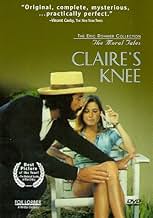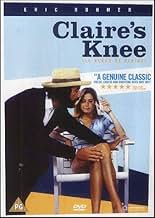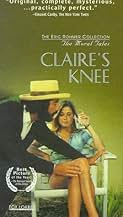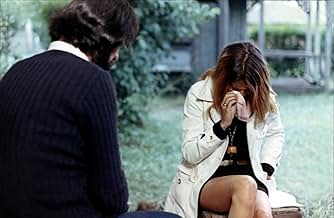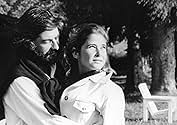Le genou de Claire
- 1970
- Tous publics
- 1h 45m
IMDb RATING
7.5/10
13K
YOUR RATING
On lakeside summer holiday, a conflicted older man is dared to have a flirt with two beautiful teenage half-sisters despite his betrothal to a diplomat's daughter and the fact that the girls... Read allOn lakeside summer holiday, a conflicted older man is dared to have a flirt with two beautiful teenage half-sisters despite his betrothal to a diplomat's daughter and the fact that the girls have boyfriends.On lakeside summer holiday, a conflicted older man is dared to have a flirt with two beautiful teenage half-sisters despite his betrothal to a diplomat's daughter and the fact that the girls have boyfriends.
- Awards
- 6 wins & 4 nominations total
- Director
- Writer
- All cast & crew
- Production, box office & more at IMDbPro
Featured reviews
After a dispiriting encounter with THE COLLECTOR (1967), the fourth number of Rohmer's SIX MORAL TALES, I feel elated that the fifth entry CLAIRE'S KNEE has rekindled my passion in Rohmer's body work, his superlative insight as regards self-boosting pretension over real agenda inward has reached a high-point in this basically nothing-has-happened miniature.
A high-flying diplomat Jérôme (Brialy) has returned to Lake Annecy to sell his family house, one month prior his wedding, he will marry the woman who he has an on-and-off relationship over 6 years. By sheer chance, he meets his old friend, the novelist Aurora (Cornu), who has lodged in Madame Walter's (Montel) lake house at the foot of the mountain nearby, to finish her latest novel.
While the two reminisce about the past and update each other with information of the intervening years, Aurora is slightly agape to know that Jérôme decides to tie the knot, in her view, he is not a marrying type, but Jérôme claims that he and her fiancée has reached a perfectly and mutually understanding phrase - an open relationship as long as there is nothing too serious to undercut their marriage, which implies that two-timing is not a problem at all.
Later Aurora introduces Jérôme to Madame Walter and her teenage daughter Laura (Romand), who, strikes up a crush on Jérôme. Aurora is stuck in writer's block, so Jérôme volunteers to be her guinea pig, to explore the situation with Laura, then reports back to Aurora with all the details. Laura is genial, precocious, coruscating with contradictory ideas (the love/dispute relation with her mother, bored/fascinated by the picturesque scenery), she is not afraid to admit her feelings for Jérôme, but when the latter attempts a wet kiss, she brushes him aside, teases that she wants to be totally in love, not with a soon-to-be-married man, yet the truth is that she will embark on her study in Britain, sooner than Jérôme's due date.
Jérôme enjoys Laura's company, takes her mountain hiking and riding in his motorboat, tries to cop a feel when timing is proper and fails epically, but how can any man not lap up the gratifying feeling of being the receiving end of a teenage girl's passing fancy?, although Laura's candid sophistication is something saps him of any further actions. However, before soon, Laura is no longer his main focal point, because Claire (de Monaghan), Laura's slightly older half-sister, a sultrier blonde arrives, so is her boyfriend, a muscle-showboating jock Gilles (Falconetti). Jérôme involuntarily develops a fetish for Claire's knee, tender, smooth and immensely arousing for his taste, he confesses to Aurora, and takes the ultimate task: to touch Claire's knee under her full consent.
So, obviously Gilles is the weak point to achieve his mission, expressing to Claire that she can find someone much better than Gilles is a stock line from a sour man who is not even qualified for competition, but insidiously avenges to break up a seemingly matched couple on a shaky pretext, it doesn't work usually, as the heart wants what its wants, there is always some behind-the-closed- door magic potion can retain a relationship, so who would take an onlooker's subjective opinion seriously, especially he is a total stranger? However, Jérôme seizes a golden opportunity, dismantles Claire's defence by aiming her Achilles heel, a young girl's intuitive insecurity, and he accomplishes his task, almost grotesquely surreal, during those time-still minutes, a whimpering Claire glances at Jérôme, whose hand is continuing rubbing her knee, she seems baffling but doesn't care to stop since it seems to be an innocuous gesture, still, in the eyes of a beholder, a latent sexual tension has reached its breaking point.
In Jérôme's self-satisfactory version, his act is bold but meritorious, not only he fulfils his primal desire, it is also beneficial for Claire, to save her from the hands of a philander, so, he leaves with triumphant brio to his approaching wedding. Aurora stays, and in the end, from her eyes, we see what happens afterwards between Claire and Gilles, it is a far cry from what Jérôme has envisioned. It is all mapped out under Rohmer's master-plan, one's shallow and subjective vision versus what happens in reality, most of time, we are prone to feel conceited by our own judgment and perception, yet, most of it is indeed a fanciful illusion, a bubble masterfully bursts under the strikingly scenic palette and a spare cast.
The acting is above-par, a heavy-bearded Jean-Claude Brialy effortlessly alternates between a welcoming rapport with an amateurish Aurora Cornu (the Romanian-born French writer, who visibly glimpses into the camera many a time and inclines to speak her lines with eyes zooming in on the floor, but those tics doesn't impede the narrative, on the contrary it renders a vérité feel), an engaging and heart-to-heart communication with the newcomer Béatrice Romand, and his voyeuristic limerence with an attractive but vapidly uninterested Laurence de Monaghan. Told in a style of visualising diary entries in a one-month span, CLAIRE'S KNEE is mostly about talking, and talking could be tedious or overbearing, or sometime both, it all depends on who's talking, and how do the repercussions pan out, here Rohmer has found his feet and to say the least, the film is an undeniable acme in Rohmer's awe-inspiring oeuvre, a significant cultural legacy bequeathed to all mankind.
A high-flying diplomat Jérôme (Brialy) has returned to Lake Annecy to sell his family house, one month prior his wedding, he will marry the woman who he has an on-and-off relationship over 6 years. By sheer chance, he meets his old friend, the novelist Aurora (Cornu), who has lodged in Madame Walter's (Montel) lake house at the foot of the mountain nearby, to finish her latest novel.
While the two reminisce about the past and update each other with information of the intervening years, Aurora is slightly agape to know that Jérôme decides to tie the knot, in her view, he is not a marrying type, but Jérôme claims that he and her fiancée has reached a perfectly and mutually understanding phrase - an open relationship as long as there is nothing too serious to undercut their marriage, which implies that two-timing is not a problem at all.
Later Aurora introduces Jérôme to Madame Walter and her teenage daughter Laura (Romand), who, strikes up a crush on Jérôme. Aurora is stuck in writer's block, so Jérôme volunteers to be her guinea pig, to explore the situation with Laura, then reports back to Aurora with all the details. Laura is genial, precocious, coruscating with contradictory ideas (the love/dispute relation with her mother, bored/fascinated by the picturesque scenery), she is not afraid to admit her feelings for Jérôme, but when the latter attempts a wet kiss, she brushes him aside, teases that she wants to be totally in love, not with a soon-to-be-married man, yet the truth is that she will embark on her study in Britain, sooner than Jérôme's due date.
Jérôme enjoys Laura's company, takes her mountain hiking and riding in his motorboat, tries to cop a feel when timing is proper and fails epically, but how can any man not lap up the gratifying feeling of being the receiving end of a teenage girl's passing fancy?, although Laura's candid sophistication is something saps him of any further actions. However, before soon, Laura is no longer his main focal point, because Claire (de Monaghan), Laura's slightly older half-sister, a sultrier blonde arrives, so is her boyfriend, a muscle-showboating jock Gilles (Falconetti). Jérôme involuntarily develops a fetish for Claire's knee, tender, smooth and immensely arousing for his taste, he confesses to Aurora, and takes the ultimate task: to touch Claire's knee under her full consent.
So, obviously Gilles is the weak point to achieve his mission, expressing to Claire that she can find someone much better than Gilles is a stock line from a sour man who is not even qualified for competition, but insidiously avenges to break up a seemingly matched couple on a shaky pretext, it doesn't work usually, as the heart wants what its wants, there is always some behind-the-closed- door magic potion can retain a relationship, so who would take an onlooker's subjective opinion seriously, especially he is a total stranger? However, Jérôme seizes a golden opportunity, dismantles Claire's defence by aiming her Achilles heel, a young girl's intuitive insecurity, and he accomplishes his task, almost grotesquely surreal, during those time-still minutes, a whimpering Claire glances at Jérôme, whose hand is continuing rubbing her knee, she seems baffling but doesn't care to stop since it seems to be an innocuous gesture, still, in the eyes of a beholder, a latent sexual tension has reached its breaking point.
In Jérôme's self-satisfactory version, his act is bold but meritorious, not only he fulfils his primal desire, it is also beneficial for Claire, to save her from the hands of a philander, so, he leaves with triumphant brio to his approaching wedding. Aurora stays, and in the end, from her eyes, we see what happens afterwards between Claire and Gilles, it is a far cry from what Jérôme has envisioned. It is all mapped out under Rohmer's master-plan, one's shallow and subjective vision versus what happens in reality, most of time, we are prone to feel conceited by our own judgment and perception, yet, most of it is indeed a fanciful illusion, a bubble masterfully bursts under the strikingly scenic palette and a spare cast.
The acting is above-par, a heavy-bearded Jean-Claude Brialy effortlessly alternates between a welcoming rapport with an amateurish Aurora Cornu (the Romanian-born French writer, who visibly glimpses into the camera many a time and inclines to speak her lines with eyes zooming in on the floor, but those tics doesn't impede the narrative, on the contrary it renders a vérité feel), an engaging and heart-to-heart communication with the newcomer Béatrice Romand, and his voyeuristic limerence with an attractive but vapidly uninterested Laurence de Monaghan. Told in a style of visualising diary entries in a one-month span, CLAIRE'S KNEE is mostly about talking, and talking could be tedious or overbearing, or sometime both, it all depends on who's talking, and how do the repercussions pan out, here Rohmer has found his feet and to say the least, the film is an undeniable acme in Rohmer's awe-inspiring oeuvre, a significant cultural legacy bequeathed to all mankind.
This is one of the best movies of Rohmer's earlier series of moral tales. The movie wonderfully depicts the complicated relatioship between the hero and his desires, represented by Claire, and the reality of Claire's younger sister, who as masterfully played by Beatrice Romand. This is a wonderful comedy of manners, in which we can laugh at all the characters, how in their attempts to fool others, they only fool themselves. Rohmer has intricately plotted every action, I enjoyed every moment of the film.
Well, I came across this movie while reading Roger Ebert's Awake in the dark and thankfully was able to get a chance to get a hold of Éric Rohmer's masterpiece Claire's Knee. I hadn't read Ebert's review (usually I watch a movie before going through the reviews) so was not sure what was I going into - haven't watched any trailer as well so I was not sure what this would be about, but with my experience with foreign movies I was sure it would be good and I guessed by the name that it suggested something like Lolita or many other movies based on such abnormal (sometimes immoral) desires.
So, when you start with the movie you are somewhat aware where this is going - the expected storyline basis the title- but soon comes to these well-performed characters and while getting engrossed in the discussions between characters on love, choices, life, etc. you get more understanding on the way each of them sees the world - what they desire? what they like? and why they do so? The great part with such discussion was that first, it didn't go into a preachy tone- that x is right and y is not, each of them had their views which they justified by their past or by their behavior - it reminded me of the Before trilogy and, second, while listening to such great lines, one start thinking and contemplating of one's own stand on the topic of love, moral & desires.
There is a scene where the protagonist talks about a notion where he as a person do not have desires on the beauty aspect of women but because of a character his friends ask him to play, he started thinking like that character, and somewhere knowingly or unknowingly he too as a person starts to have those desires. The beauty of this notion is that this happens to the viewer as well, you don't look at claire's knee or her in that sense- but because the movie tells you that this is important - this is beautiful - and to be desired you look for it in that passionate way. You too, play the character in the movie.
So, when you start with the movie you are somewhat aware where this is going - the expected storyline basis the title- but soon comes to these well-performed characters and while getting engrossed in the discussions between characters on love, choices, life, etc. you get more understanding on the way each of them sees the world - what they desire? what they like? and why they do so? The great part with such discussion was that first, it didn't go into a preachy tone- that x is right and y is not, each of them had their views which they justified by their past or by their behavior - it reminded me of the Before trilogy and, second, while listening to such great lines, one start thinking and contemplating of one's own stand on the topic of love, moral & desires.
There is a scene where the protagonist talks about a notion where he as a person do not have desires on the beauty aspect of women but because of a character his friends ask him to play, he started thinking like that character, and somewhere knowingly or unknowingly he too as a person starts to have those desires. The beauty of this notion is that this happens to the viewer as well, you don't look at claire's knee or her in that sense- but because the movie tells you that this is important - this is beautiful - and to be desired you look for it in that passionate way. You too, play the character in the movie.
Like most of Eric Rohmer's work, you will either enjoy the laid-back atmosphere and chatty characters in Claire's Knee, or find it all incredibly boring. I happen to love them. It's rare to find movies that don't want to be sensationalistic and violent, but would rather present universal questions and then investigate them throughout the course of the movie.
I would recommend Love in the Afternoon as an entry into Rohmer however, as it is a little more pacey for those unfamiliar with his style. And my personal favourite is "The Green Ray"... but don't start there as the subject of the film is about boredom!
I would recommend Love in the Afternoon as an entry into Rohmer however, as it is a little more pacey for those unfamiliar with his style. And my personal favourite is "The Green Ray"... but don't start there as the subject of the film is about boredom!
There's a lot to enjoy in Claire's Knee: the relaxed easy pace, the charming characters, the warm and insightful conversations, the stunning scenery of the French Alps.
Unfortunately I can't find any way to identify or empathize with a world that is so comfortable, so boring, so unambiguous, and ultimately, so superficial. None of the characters seem to work; no-one ever seems anxious or troubled; nothing particularly bad or good happens, or seems likely to ever happen. It's a film of low-level emotions, and low stakes -- for the characters, and for the viewers.
In this bland world, the only question of importance becomes: will the main character, a man of 35 or older, seduce one of the two teenage beauties? No particularly momentous moral calculus is involved, and ultimately the stakes were so low that I could not bring myself to care. The character is good man, or he's a lecher, or he's neither...but I feel Rohmer did not give me any reason why any of this might matter.
Claire's Knee is a hymn of praise to French charm, bourgeois comforts, and inconsequential easy pleasures. If that's your thing, enjoy yourself with this film. Me, I'll be over there in the corner, watching films by directors that ask harder questions.
Unfortunately I can't find any way to identify or empathize with a world that is so comfortable, so boring, so unambiguous, and ultimately, so superficial. None of the characters seem to work; no-one ever seems anxious or troubled; nothing particularly bad or good happens, or seems likely to ever happen. It's a film of low-level emotions, and low stakes -- for the characters, and for the viewers.
In this bland world, the only question of importance becomes: will the main character, a man of 35 or older, seduce one of the two teenage beauties? No particularly momentous moral calculus is involved, and ultimately the stakes were so low that I could not bring myself to care. The character is good man, or he's a lecher, or he's neither...but I feel Rohmer did not give me any reason why any of this might matter.
Claire's Knee is a hymn of praise to French charm, bourgeois comforts, and inconsequential easy pleasures. If that's your thing, enjoy yourself with this film. Me, I'll be over there in the corner, watching films by directors that ask harder questions.
Did you know
- TriviaNot counting a picture frame seen from a distance, the title character's first appearance takes place 47 minutes into the film.
- GoofsNear the end of the movie, Jerôme and Claire Annecy are going by boat to Annecy but must seek refuge under a shelter because of a storm. During their conversation, the irregular flow of the watering device used to create the big rain can be heard clearly.
- ConnectionsEdited into 365 days, also known as a Year (2019)
Details
- Release date
- Country of origin
- Language
- Also known as
- Six Contes Moraux V: Le genou de Claire
- Filming locations
- Production company
- See more company credits at IMDbPro
Box office
- Gross worldwide
- $5,112
- Runtime1 hour 45 minutes
- Sound mix
- Aspect ratio
- 1.37 : 1
Contribute to this page
Suggest an edit or add missing content


![Watch Bande-annonce [OV]](https://m.media-amazon.com/images/M/MV5BMTgyOTk2NmMtZTk3ZS00Yjg4LWIwMzEtM2RmZDQ0ZWVhZWUzXkEyXkFqcGdeQXRyYW5zY29kZS13b3JrZmxvdw@@._V1_QL75_UY281_CR10)

